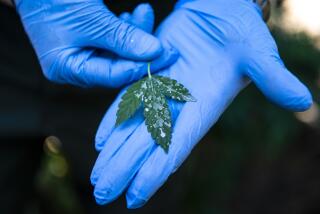Pepsi Affair Tests Skill of New Investigative Crew : Product safety: FDA unit teams with other agencies to quickly unmask series of alleged tamperings as hoaxes.
- Share via
WASHINGTON — The escalating reports of syringes in cans of Diet Pepsi that reached a crescendo across the nation last week provided the first real test for a new corps of criminal investigators created by the Food and Drug Administration.
Those investigators, with the help of the FBI and other agencies, have been credited with quickly coming to grips with the series of alleged tamperings--all of them found so far to be hoaxes--before the phenomenon became more dangerous.
“What was critical was time--we had to break this cycle very fast,” FDA Commissioner David A. Kessler said in an interview Saturday. “The timing couldn’t have been better. A couple of months earlier, we were not up to speed. There were not enough people. We would not have been able to handle this.”
The string of tampering reports began June 9, when an 82-year-old man in Tacoma, Wash., said he found a syringe in a can of Diet Pepsi. No conclusion has been reached yet in that complaint. In rapid succession, more than four dozen complaints about syringes and other objects in Pepsi cans were recorded from at least 23 states.
By Thursday, the FDA had determined that virtually all the reports were hoaxes and by Saturday, at least 13 people had been arrested for making false reports.
The chief of the FDA’s newly created division, Terry Vermillion, a 23-year Secret Service veteran, said that immediately after the first tampering reports, about 60 investigators began fanning out to every locale where a report was made, accompanied by polygraph experts provided by the Secret Service, the FBI and state and local police.
“These cases are not like rocket science--they’re not that complex,” Vermillion said, describing the team’s work. “It’s basically talking to people and separating fact from fiction. Once you start talking to a subject, you can begin to read his or her responses. . . . It’s behavioral science, and you can learn after a while when someone is telling the truth.”
In one of the cases, for example, the investigating agents re-enacted the scene in front of the subject--exactly as the subject had described.
Apparently, there were so many inconsistencies and holes in the account that “the subject looked up and realized the story was so ludicrous that the subject said: ‘OK, you got me,’ ” Vermillion said.
“This is a very dynamic situation,” he added. “All this attention, tons of people asking you questions. If you’re telling the truth, you tell the same story every time. If you made it up, you’d have to remember that story exactly the same way because you might have to tell it 15 times--and most people aren’t able to do that. Most experienced agents, within the first few minutes, can tell whether someone’s holding something back.”
The FDA said it received considerable help from other agencies, including the FBI, which traditionally works with the FDA in such cases.
“We still work very strongly with the FBI,” said Kessler, “but now we also have our own capability.”
Until now, the FDA, which has always had strong scientific and forensic capability to inspect manufacturing plants or blood banks, for example, had virtually no criminal investigative skills.
“We have excellent inspectors and investigators, but they are trained in the scientific and regulatory mode,” Kessler said. “We needed to add to this the ability to conduct criminal investigations.”
Since it established the new office two years ago, the FDA has been quietly building up the force, which is expected eventually to total 92 people.
The agents, whose average age is 35 and who often come from other federal agencies--such as the Drug Enforcement Administration, the U.S. Customs Service or the CIA--are trained at the Federal Law Enforcement Training Center in Glynco, Ga., where they learn--or relearn--traditional criminal investigative techniques, from how to conduct interviews and surveillance, to defensive driving.
Vermillion left the Secret Service to set up the new office. “Where else do you get the opportunity to put your fingerprint and establish everything from the ground floor in a new investigative agency?” he said.
Meanwhile Saturday, Pepsi launched a media blitz with full-page newspaper ads proclaiming victory over the hoaxers.
“Pepsi is pleased to announce . . . nothing,” said the ads, which appeared in 200 newspapers. “As America now knows, those stories about Diet Pepsi were a hoax. Plain and simple, not true.”
Perhaps. But for the FDA, “it’s not over yet,” Vermillion said. “We have a lot of mop-up actions left. But we’re glad we could do what we did.”
More to Read
Sign up for Essential California
The most important California stories and recommendations in your inbox every morning.
You may occasionally receive promotional content from the Los Angeles Times.













